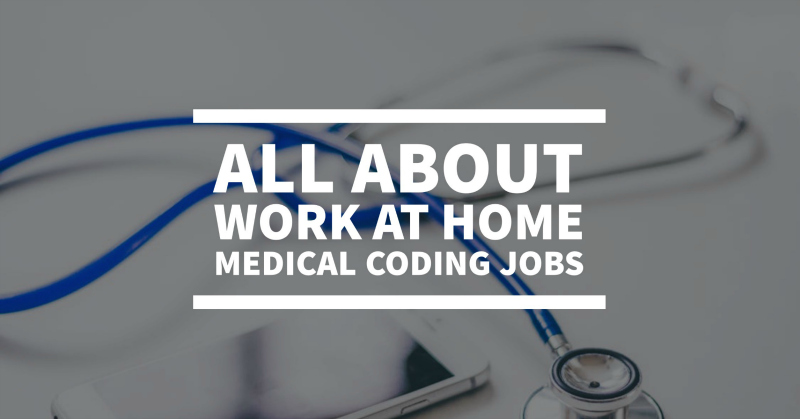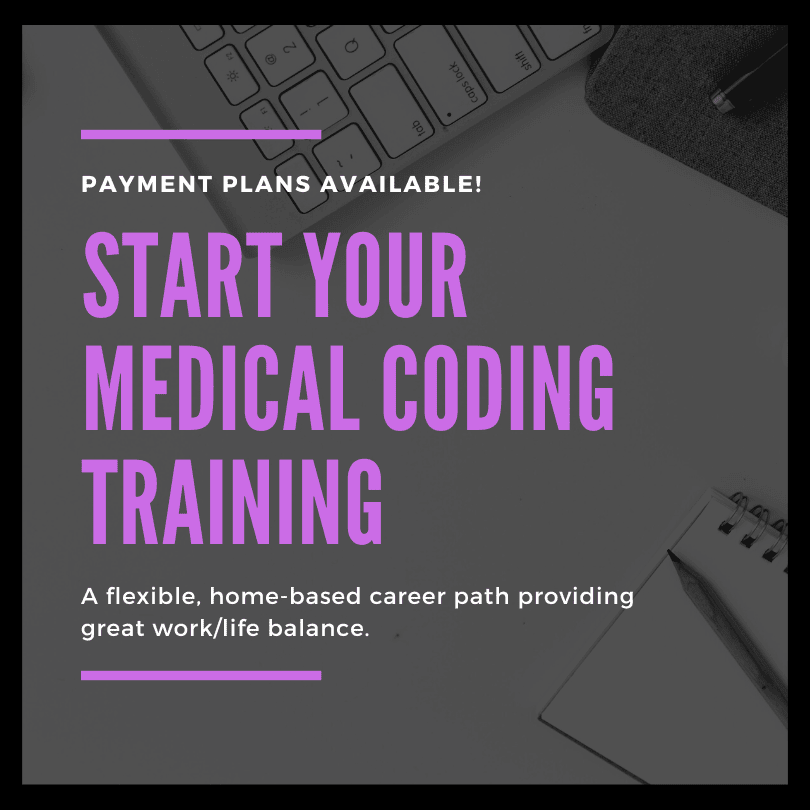A lot of people tend to be curious about remote medical coding jobs because they think it's quick, easy work at home employment.
However, just like medical billing from home, this isn't something you can just dive right into and start doing.
Almost every company that would hire you to do this is going to require that you have certification before you can start work, and possibly a degree as well.
All that said, don't get discouraged. If you want to do this, it's possible. Below, I have all the details for you on what's required to get going with this.
What are medical coding jobs?
Medical coders convert medical services rendered into codes for billing. There is a code for pretty much every medical service out there, and you will see these listed when you receive a bill from a doctor and/or hospital.
There are also unique codes for medical diagnoses and various supplies used in medical facilities, so this job is actually much more complex than it sounds at first.
Medical coders have to take care to be extremely accurate in what they do to ensure that everything gets billed correctly.
How much do medical coders make?
According to Salary.com, the average medical coder earns $58,000 per year.
What is required to start as a medical coder?
Almost any company you work for is going to want to know you've been certified either through the American Health Information Management Association (AHIMA) or the American Academy of Professional Coders (AAPC).
Companies that hire for medical coding may also be looking for people who have an RHIA or RHIT degree (Registered Health Information Administrator or Registered Health Information Technician), CPS (Certified Coding Specialist), or CPC (Certified Professional Coder).
Most vocational schools and many universities — both online and offline — offer courses you can take to get started in this field, after which you can take a credentialing exam.
If you are looking for online programs, CareerStep usually comes highly recommended, and it's the online school I typically direct readers to when they ask me about training for coding, billing, or medical transcription.
They offer payment plans for their tuition as well as discounts for military spouses.
How long does it take to get certified?
It could take anywhere from six months to one year to finish school so that you can take your certification exam.
If you are after an RHIA or RHIT degree, you may be looking at two to four years.
Who hires work from home medical coders?
There are several companies that have remote medical coding jobs open. Most companies require past experience, but not all. Many companies will consider CareerStep graduates.
Indeed and FlexJobs share remote medical coding positions regularly. Note FlexJobs is not a free job board, but you can get 30 percent off their low membership fee with promo code AFFILPROMO.
You can also check doctor's offices and hospitals locally to see if they have any remote coding positions available and inquire if you can work from your home.
Medical Coding Scams
You have to watch out for scams with medical coding jobs. Do not pay for a fly-by-night medical coding course from a company that isn't reputable, especially if the advertisement you found is promising you'll be making all kinds of money in 30 days or less.
That just doesn't happen in the medical coding field.
It takes time to learn everything you need to know and finish your courses — as mentioned above, it could take a year or longer.
Good luck if you decide to pursue medical coding as a work at home career!

Anna Thurman is a work at home blogger and mom of two. She has been researching and reviewing remote jobs for over 13 years. Her findings are published weekly here at Real Ways to Earn.



Thanks for all this information Anna. My daughter will especially like this since she has some medical coding training. Already passed this along. 🙂
Have a great week!
Cori
I have my diploma in billing and coding. However since I do not have any experience it is hard to find a position. I went to a school that has job placement but, I am in an area that does not have many opportunities. If anyone does decide to go to school for this I would recommend finding a school that has an internship. It will make the job search easier. My school did not have this.
Thanks for this post! Im currently a nurse and study to get certified as a CPC through AAPC..Im hoping to travel and work from home than the typical nursing home setting
Karis
I have been doing medical billing/coding for 17 years now. I got lucky, I had a little experience in an insurance company first (basically knowing what a 1500 form looked like), and a woman was retiring at a family practice office. She trained me. I still have not pursued my certification. There is a lot more to medical coding than just codes…there is also the billing aspect of it all, in many different areas as well as knowing what insurance companies have certain rules/regulations. My pay is above average because of my experience. I hired a “coder” right out of school to give her the opportunity I knew no one else would. She had learned nothing, and paid a ton of money for her schooling. Be careful when choosing a school that promises job placement. Its more difficult than they say. Its much easier and rewarding for your future if you have a position in the field first off. Even a patient intake coordinator or receptionist in an office or hospital. You can absolutely learn a lot in that atmosphere. Yes its a great career, but its hard to get there. And most places will hire the more experienced oppose to the newly “certified” person. This article was great to read and more realistic than most. Either way good luck in your paths…it can happen, just takes time and patience.
It took me 6 months to find a billing job at an Eye Docs office after I completed my six month certification course at SUNY Binghamton. Most offices want at least three years hands on experience. I got lucky this eye doc gave me a chance. The experience I gained led me to two great hospital jobs but my end goal is to work at home. I’m still searching for that billing dream job at home six years later. Good luck to you all. Happy Coding
Very informative article! Just one correction, a certified coding specialist is a CCS not a CPS for those trying to research certifications and is thru AHIMA
Currently I’m working towards my bachelor’s degree in health information management after having taken 1 1/2 years of medical billing and insurance coding, along with another 2 years obtaining my associate’s degree in medical billing and insurance coding all at the university level. I will say that the degrees are a definite plus when it comes to getting hired in the health information field; especially because of all the health care laws and regulations. It is a very rewarding career and there are a variety of jobs within the health information field besides coding. Additionally, as CPC Coder II pointed out a great number of individuals will be retiring, along with the fact that people are living longer so when looking at these 2 things alone there are and will continue to be some great opportunities available for some time to come yet. Coding isn’t easy however; and just the college course work alone can be grueling, but definitely worth it in the end. Good luck with whatever you decide, but just wanted to give you some support and say that it is a great field as well as an excellent paying and very rewarding career. Best of luck to you in your future endeavors! : )
Make sure you get certified through an AHIMA or AAPC accredited school. And then once you graduate and get certified, apply to any and all job openings in your area. You will NOT get hired by any remote companies without AT LEAST 2-3 years with an on-site hospital. Although many hospitals/clinics don’t advertise it, many will allow you to move to remote/from home after your are fully trained and meet the accuracy rates they have set. There will be TONS of jobs available after the ICD-10 implementation in October 2014, as many of the “old timers” will be quitting or retiring because they don’t want to learn a whole new system. It would be advisable to start a coding program NOW so that you at least have a degree by the time ICD-10 rolls around. Many hospitals will see you as a valuable asset to “train new” because you won’t have the current ICD-9 system stuck in your head. good luck!
Thank you for the additional insight!
Hey Jen, check out indeed forums. I just learned a few things myself and I need to clarify what I said in my previous comment. It’s not that job opportunities are slim in this field, to the contrary but many want you to have a couple years of experience. It makes plenty of sense because newbies make more mistakes and probably have a higher percentage of rejection rate, which costs the company or institution money.
I am considering this profession as well, and is in the process of researching, however, if job opportunities are slim, I’ll have to reconsider.
I’ve considered going to school for this but got somewhat discouraged at the fact that your chances of finding a job after graduation is slim. I wonder how people in this field get started? Do they start off as a receptionist? Just doesn’t make any sense to me lol. It’s something I still want to pursue but it’s just really discouraging.
Yep, I wondered the same thing, Chloe. Everyone has to start somewhere. I guess there may be some places out there that take newbies, but apparently they are not too common. Maybe some of the colleges and vocational schools have job placement programs that help some people out.
Yeah if I do decide to go to school, I’ll definitely look at schools with job placement and try to connect with some previous students to see what their experiences were. I’ve been dancing around going to school for this for quite some time..but having so many years of experiences is putting me off. I did stumble across a list of companies that hire newbies, once I confirm, I’ll be sure to pass it on to you. Enjoy the rest of your weekend.
Yes! I would like if you would past the information about newbies for medical coding! And any other healthcare employment. Ward163 @ yahoo com
Studying for healthcare administration.